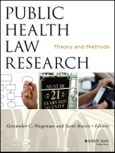Public Health Law Research: Theory and Methods definitively explores the mechanisms, theories and models central to public health law research - a growing field dedicated to measuring and studying law as a central means for advancing public health.
Editors Alexander C. Wagenaar and Scott Burris outline integrated theory drawn from numerous disciplines in the social and behavioral sciences; specific mechanisms of legal effect and guidelines for collecting and coding empirical datasets of statutory and case law; optimal research designs for randomized trials and natural experiments for public health law evaluation; and methods for qualitative and cost-benefit studies of law.. They also discuss the challenge of effectively translating the results of scientific evaluations into public health laws and highlight the impact of this growing field.
“How exactly the law can best be used as a tool for protecting and enhancing the public’s health has long been the subject of solely opinion and anecdote. Enter Public Health Law Research, a discipline designed to bring the bright light of science to the relationships between law and health. This book is a giant step forward in illuminating that subject.” -- Stephen Teret, JD, MPH, Professor, Director, Center for Law and the Public's Health, Johns Hopkins Bloomberg School of Public Health
“Wagenaar and Burris bring a dose of much needed rigor to the empirical study of which public health law interventions really matter, and which don’t.” -- Bernard S.
Table of Contents
Figures and Tables vii
Foreword ix
Michelle A. Larkin
Preface xi
Acknowledgments xiii
The Editors xv
The Contributors xvii
PART ONE Framing Public Health Law Research
1. A Framework for Public Health Law Research 3
Scott Burris, Alexander C. Wagenaar, Jeffrey W. Swanson, Jennifer K. Ibrahim, Jennifer Wood, and Michelle M. Mello
2. Law in Public Health Systems and Services Research 23
Scott Burris, Glen P. Mays, F. Douglas Scutchfield, and Jennifer K. Ibrahim
PART TWO Understanding How Law Influences Environments and Behavior
3. Perspectives from Public Health 49
Kelli A. Komro, Ryan J. O’Mara, and Alexander C. Wagenaar
4. Law and Society Approaches 87
Robin Stryker
5. Criminological Theories 109
Wesley G. Jennings and Tom Mieczkowski
6. Procedural Justice Theory 131
Tom R. Tyler and Avital Mentovich
7. Economic Theory 147
Frank J. Chaloupka
8. The Theory of Triadic Influence 169
Brian R. Flay and Marc B. Schure
9. Integrating Diverse Theories for Public Health Law Evaluation 193
Scott Burris and Alexander C. Wagenaar
PART THREE Identifying and Measuring Legal Variables
10. Picturing Public Health Law Research: The Value of Causal Diagrams 217
Jeffrey W. Swanson and Jennifer K. Ibrahim
11. Measuring Statutory Law and Regulations for Empirical Research 237
Evan D. Anderson, Charles Tremper, Sue Thomas, and Alexander C. Wagenaar
12. Coding Case Law for Public Health Law Evaluation 261
Mark Hall
PART FOUR Designing Public Health Law Evaluations
13. Evaluating Public Health Law Using Randomized Experiments 283
Alan S. Gerber, Donald P. Green, and Allison J. Carnegie
14. Natural Experiments: Research Design Elements for Optimal Causal Inference Without Randomization 307
Alexander C. Wagenaar and Kelli A. Komro
15. Qualitative Research Strategies for Public Health Law Evaluation 325
Jennifer Wood
16. Cost-Effectiveness and Cost-Benefit Analysis of Public Health Laws 347
Ted R. Miller and Delia Hendrie
17. The Future of Public Health Law Research 379
Scott Burris and Alexander C. Wagenaar
References 387
Name Index 443
Subject Index 461








